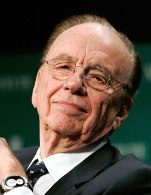 Harold Evans, legendary editor of The Sunday Times, who famously resigned after falling out with media baron Rupert Murdoch, on Thursday ridiculed the latter's claims at the Leveson Inquiry on Wednesday about events at the newspaper.
Harold Evans, legendary editor of The Sunday Times, who famously resigned after falling out with media baron Rupert Murdoch, on Thursday ridiculed the latter's claims at the Leveson Inquiry on Wednesday about events at the newspaper.
Evans, who was editor of the Sunday newspaper from 1967 to 1981 and is credited with setting high standards of journalism, responded in an article in The Guardian as Murdoch prepared to appear before the inquiry for the second day on Thursday to respond to the issue of phone-hacking.
"Rupert Murdoch has apparently lost a great deal of his power of memory, but nature has compensated by endowing him with a vivid imagination.
"He can surely deploy his new gift in the service of Fox movies," Evans wrote.
Murdoch mentioned Evans during the deposition in unflattering terms, particularly an incident in which he quoted Evans as saying in a closed room: "Look, tell me what you want to say, what do you want me to say, and it need not leave this room and I'll say it."
"Murdoch claimed he responded by saying: "That is not my job."
Evans wrote: "As the editor in question, I am not able to compete with Murdoch in fabrication -- he has had a lifetime of experience -- but I do happen to have retained my memory of the year editing the Times, made notes, kept documents and even had the effrontery to write a whole bestselling book about it in 1983, called Good Times, Bad Times".
Evans went on: "There is a pattern to the Murdoch sagas. He responds to serious criticism by a biting wisecrack or diversionary personal attack.
"What is denied most sharply invariably turns out to be irrefutably true. As with the hacking saga, so with my charges."
"Murdoch's performance before Leveson and his myth about me suggests that he might do well on the road as the man with the most convenient memory in the world," Evans wrote.
Murdoch's evidence before the inquiry continued to cause ripples in the corridors of power, after he disclosed that he had met Prime Minister David Cameron on at least five more occasions than Cameron has previously admitted.
Downing Street has earlier disclosed that Cameron had met Murdoch twice since May 2010.
In the wake of the phone hacking scandal, Cameron had published details of his meetings with media executives and editors.
Cameron is likely to be questioned about the inconsistency in the number of meetings when he appears before the committee in the near future.
Image: Rupert Murdoch






